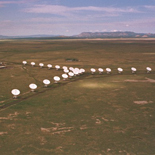
Very Large Array (NRAO/AUI)
UGS - Spring 2010
EXTRATERRESTRIAL LIFE
Unique Nos. 63985, 63990, 63995, 6400, 64005, 64010, 64105, 64020, 64025, 64030, 64035, 64040
Professor
RLM 15.204 · (512) 471-6446 (office), 478-2748 (home) · email
Courses - Spring '10 | Course Website
UGS 303-Course Description
Signature Course: The “Signature Course” is a fairly new requirement at UT, and this is my first attempt to teach
one of them. To paraphrase the description given by the University: Signature courses are restricted to first-year
students, and consist of a large-group lecture and a smaller discussion class, focusing on a contemporary issue.
These courses are designed to introduce undergraduates to scholarly analysis from an interdisciplinary perspective,
and include an introduction to University resources, such as research facilities, museums, and attendance at
University lectures or performances as assigned.
Topics: The course covers a wide range of topics, drawing on astronomy, physics, chemistry, biology, cognitive
science, and more. The table of contents of the text gives a good idea of the subjects covered in the class. A more
detailed summary is given below.
Brief description (please read in detail, later)
Whether or not we are alone in the universe is a question that has a long speculative history, but has more recently become
a scientific field of research, the subject of this course. We want to know whether our world, and the life it supports, is a
fluke, or whether our Galaxy could be teeming with planets inhabited by complex organisms, and what sort of scientific
approach can even address such questions.
We will discuss possibilities for Earth-like worlds, the living state, complex organisms, forms of intelligence in our Galaxy, as well as the potential for communication with extraterrestrial civilizations. Those five possibilities form the topics of the five major sections of this course.
We also discuss current research projects aimed at detecting extraterrestrial worlds and their potential inhabitants using biosignatures, intentional signals, and, perhaps someday, direct visitation of other star systems—in other words star travel. These topics sound like a lot of fun, but don't let that fool you. In order to take a serious approach to the subject at hand, we need to avoid opinions, speculations, or preconceptions, but do need elements from many fields of research. The course tries to communicate, and examine, an interdisciplinary scientific worldview that combines elements of astronomy, physics, chemistry, biology, cognition, and more, and asks whether such a view can explain or predict the complexity of phenomena, using the living state ("life"), and the cognitive state (“intelligence”) as the primary targets. We basically are trying to find if there is a reasonable approach to give us some indication whether these features of our planet are likely to be features of planets orbiting other stars.
The current inability of any worldview to provide concrete, or even partial, answers to most of our questions provides a useful basis for questioning whether we should expect advanced extraterrestrial civilizations, if they exist, to be anything like us. It also allows us to question whether assertions of knowledge in other fields, or in other courses, or anywhere, have any solid basis.
Current issues that are addressed include: Ongoing attempts to create synthetic life and its implications; the imminent discovery of an Earth-like planet (perhaps during this semester!); planetary change, with a focus on rapid climate evolution; the nature and varieties of intelligence; whether there exist real motivations for preservation of diversity of genomes, languages, cultures; the mysterious nature of our existence in a seemingly random world; the limits to predictability of anything; and the stability and collapse of technological societies.
Such a wild variety of topics requires some discipline to avoid simple opinions or speculations, a willingness to try out new ideas, and the development of an interdisciplinary perspective on knowledge, what might be called a flexible mind. I hope it will also be fun.